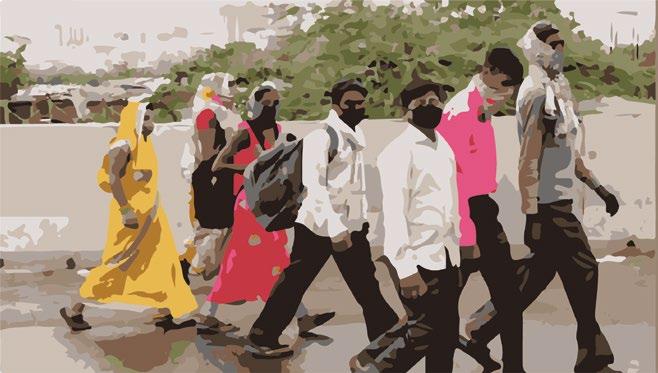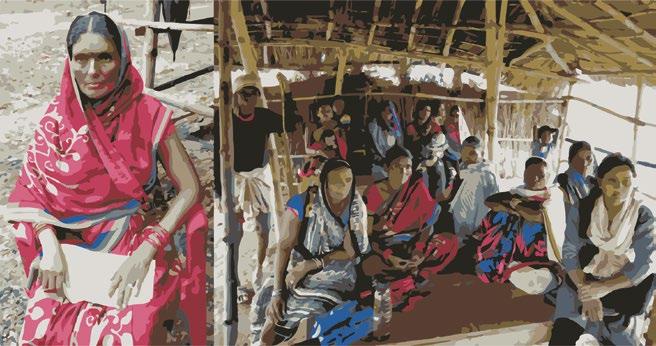
6 minute read
Dalits
Rohit Vemula, a PHD student was the victim of cast discrimination, forced him to take his own life.
Dalits in India: Battling oppression and discrimination even today
Dalits are a class of people peculiar to India where the caste system is so stringent, it is being followed even in the 21st century. The term Dalit means ‘oppressed’, ‘broken’ or ‘scattered’ in Sanskrit and is used for people belonging to castes in India who have been subjected to untouchability. In legal and constitutional terms, Dalits are known in India as scheduled castes.
The philosophy of caste is contained in the Manusmriti, a sacred Hindu text dating from the second century BCE. ‘Untouchable’ outcast communities were forbidden to join in the religious and social life of the community and were confined to menial tasks that were viewed as polluting, such as animal slaughter, garbage picking, cleaning sewers and so on. Even in 2020, more than 90%1 employees in sanitation and cleaning sector are Dalits. Two great leaders had two different approaches for their upliftment. Mahatma Gandhi believed in raising the status of Dalit people while retaining elements of the traditional caste system while Dr. Babasaheb Ambedkar, who was himself a Dalit, believed that change can be brought about only by destroying the caste system. He demanded separate legal and constitutional recognition similar in status to that accorded to Muslims, Sikhs and Christians, which was not agreeable to Gandhi. So, he gave up that demand and converted to Buddhism and many Dalits followed his footsteps. As per the 2011 National census, the total female population of India stands at 58.7 crore of which 16.68% are Dalit women. In India, Dalit and Adivasi women’s gender, compounded with their caste, makes them the most vulnerable to systemic and structural discrimination. The COVID-19 pandemic outbreak has created another layer of hardship for them. According to the NCRB, 2018 every day 10 Dalit and Adivasi women are raped and there is a
total of 6159 crimes registered against Dalit women and about 1882 crimes registered against Adivasis women under Scheduled Castes and the Scheduled Tribes (Prevention of Atrocities) Act, 1989 (SC/ST Act), these crimes include Rape, attempt to rape, assault, sexual harassment, intent to disrobe, voyeurism, stalking, insult to modesty. The discrimination against Dalits in India exists in every sphere of life, be it academic, political, social or economic. It is still not acceptable in society that a High caste girl marry a low caste boy, which then leads to incidents of honour killings, where the girl’s family kills the boy, in many cases even several years after their marriage. These incidents are quite rampant in the country and despite courts giving harsh sentences in such cases, there seems to be no deterrence.
Laws and other provisions
The Scheduled Castes and Scheduled Tribes (Prevention of Atrocities) Act is a law that specifically addresses crimes against Dalits. These crimes include, boycotting, force-feeding substances not fit for human consumption, dumping disgusting substances (ex. animal carcass) inside or at the entrance of the house, not allowing entry to SC/ ST members to public places, verbally abusing or insulting using casteist slurs and so on. It also includes offences like making false statement against them, illegal takeover of property, and interfering with voting rights.
There is also a National Commission for Scheduled Castes that has the mandate to investigate into cases of atrocities against Dalits but in practice, there is little the Commission does for upliftment of the community, and usually remains silent even when cases of atrocities against Dalits are reported almost daily.
Judicial intervention
There is a popular opinion that the Supreme Court, which mostly has upper caste persons as judges, has mostly misconstrued the concept of reservations for SCs as well as STs and have not dealt with issues of Dalits in the most adept manner. In Dr. Subhash Kashinath Mahajan vs The State Of Maharashtra (decided on March 20, 2018), the Supreme Court diluted the provisions relating to immediate arrest on commission of offences by stating that preliminary inquiry be conducted before arrest. This was nullified by the legislature by an amendment to the law.2
Again, the apex court in Khuman Singh v. State of Madhya Pradesh (decided on August 27, 2019) weakened the SC/ ST Act by setting conviction in a case of murder of a Dalit by stating that, “there is no evidence to show that the offence was committed only on the ground that the victim was a member of the Scheduled Caste and therefore, the conviction is not sustainable”.
Dalit Christians still are not considered as Dalits under the Constitution since the Presidential order on Scheduled Castes included only Hindus and later Sikhs and Buddhists were added to the list. Nearly 70% of the Christian population in India are from Scheduled Caste backgrounds.3 A writ petition filed in 2004 for inclusion of Christians still awaits a verdict from the Supreme Court.
“The effect of caste on the ethics of the Hindus is simply deplorable. Caste has killed public spirit. Caste has destroyed the sense of public charity. Caste has made public opinion impossible” – Dr. BR Ambedkar

Being Dalit amidst the COVID-19 pandemic The political and economic standing of Dalits has made them more vulnerable to the plight of the virus. Majority of the lower caste people live in rural areas away from essential goods shops, quality healthcare, internet connectivity and other services. A village in Andhra Pradesh did not have access to milk for a long time because of restrictions on movement. In Kerala, a 14-yeardied by suicide as she was unable to access online classes. These stories are evidence of government’s failure to Further, owing to rampant social discrimination, Dalits are sometimes driven to suicide. Some cases in the past few years have been of Rohit Vemula, and Dr. Payal Tadvi whose deaths have been dubbed ‘institutional murders’. These are only the cases that were highlighted in the media due to extreme outrage, there are many such that miss the media glare. The mainstream news media usually ignores stories about the plight of Dalits, thus these subjects never become an active
old daughter4 of a daily wage worker provide for the Dalit community.5
part of daily discourse. As far as political leadership goes, there is Mayawati who leads the Bahujan Samaj Party (BSP), there is Chandrashekhar Azad who leads the unregistered organization called Bhim Army (fashioned on the ‘Jai Bhim’ slogan of Ambedkarites) and there is Prakash Ambedkar6 leading Vanchit Bahujan Aghadi (VBA) and Jignesh Mewani, an independent MLA from Gujarat, to name a few. Upliftment of Dalits is viewed as a threat by upper castes since Dalits are driven by the Ambedkarite ideology of destruction of caste system. Hence, upper castes view this as a threat their power and place in the social hegemony.
The All India Survey on Higher Education for 2018- 2019 reports that Dalits account for only 14.9% of the 37.4 million students enrolled in higher education.7 Data from the National Family Health Surveys (NFHS) indicates that Dalit women die younger compared to the dominant caste women due to the existing disparities in health systems.8
The way forward
Strengthen the National Commission for Scheduled Castes by widening its mandate and ensuring regular appointments Backlogs in reserved seats for Dalits be filled up by arranging special recruitment drives Increase budget allocation for education and provide for special scholarship for Dalit students Reservation in promotions in public sector and reservation in private sector
1) https://feminisminindia.com/2020/04/17/hunger-kill-virus-food-distribution-priority-now/ 2) http://socialjustice.nic.in/writereaddata/UploadFile/PoA_Act_2018636706385256863314.pdf 3) National Council of Churches in India https://www.thehindu.com/news/national/70-year-wait-for-dalit-christians-muslimson-sc-verdict-over-castestatus/article32312331.ece 4) https://www.news18.com/news/india/unable-to-attend-online-classes-14-year-oldkerala-girl-sets-herselfablaze-2648871.html 5) https://feminisminindia.com/2020/06/11/dalitlivesmatter-atrocities-against-dalitsincrease/ 6) Grandson of Babasaheb Ambedkar, former Member of Parliament 7) http://aishe.nic.in/aishe/viewDocument.action?documentId=263 8) https://www.livemint.com/Politics/Dy9bHke2B5vQcWJJWNo6QK/Dalit-women-in-India-die-younger-than-upper-castecounterpar.html










